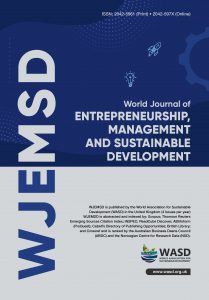Impact of formal credit on tomato trader’s welfare in the Upper East Region of Ghana: a propensity score matching estimation, Ernest Amrago, Dr. Nicholas Mensah, Therea Bazimwomit, Stanley Kambilige, Jeffery Asare, Anthony Donkor and Frank Tutu
 Dr. Nicholas Oppong Mensah
Dr. Nicholas Oppong Mensah
Department of Agricultural Economics, Agribusiness and Extension
University of Energy and Natural Resources, Sunyani
Ghana
Email: nicholas.mensah@uenr.edu.gh
Therea Kolpok Bazimwomit
Department of Agricultural Economics, Agribusiness and Extension
University of Energy and Natural Resources, Sunyani
Ghana
Email: btnayinzor@gmail.com
Stanley Kambilige
Department of Agricultural Economics and Agribusiness, Legon
University of Ghana, Greater Accra
Ghana
Email: kspabora@gmail.com
Ernest Amrago
Department of Agricultural Economics, Agribusiness and Extension
University of Energy and Natural Resources, Sunyani 214
Ghana
Email: ernestchristliebamrago@yahoo.com
Jeffery Asare
Department of Agricultural Economics, Agribusiness and Extension
University of Energy and Natural Resources, Sunyani 214
Ghana
Email: kasare14@gmail.com
Anthony Donkor
Department of Agricultural Economics, Agribusiness and Extension
University of Energy and Natural Resources, Sunyani
Ghana
Email: anthony.donkor@uenr.edu.gh
Frank Osei Tutu
Department of Agricultural Economics, Agribusiness and Extension
University of Energy and Natural Resources, Sunyani
Ghana
Email: frank.tutu@uenr.edu.gh
DOI: 10.47556/J.WJEMSD.18.3.2022.3
Purpose: In this study, we examine the impact of formal credit on tomato trader’s welfare in the Upper East Region of Ghana.
Design/methodology/approach: A total of 282 tomato traders were sampled for the study. Logistic regression, propensity score matching and the Kendall’s coefficient of concordance was respectively used to determine factors influencing formal credit access, impact of formal credit on tomato trader’s welfare and the constraints militating against formal credit access.
Findings: The logistic regression revealed that different sets of demographic and institutional factors have varying influences on formal credit access. Having access to formal credit significantly has positive impacts on the outcome variables: annual income, consumption expenditure, health expenditure, education expenditure and value of asset. The most pressing constraints militating against access to formal credit were, collateral requirements, need for guarantor and the frequent rate of payment.
Originality: The research provides relevant information on the determinants of formal credit access, impact of formal credit on tomato traders welfare and the constraints militating against formal credit access in the Upper East Region of Ghana.
Keywords: Formal Credit; Welfare; Impact; PSM; Ghana.
Citation: Mensah, N.O., Bazimwomit, T.K., Kambilige, S.P., Amrago, E.C., Asare, J.K., Donkor, A. and Osei Tutu, F. (2022): Impact of
Formal Credit on Tomato Trader’s Welfare in the Upper East Region of Ghana: A Propensity Score Matching Estimation. World Journal of Entrepreneurship, Management and Sustainable Development, Vol. 18, No. 3, pp. 345–361.

